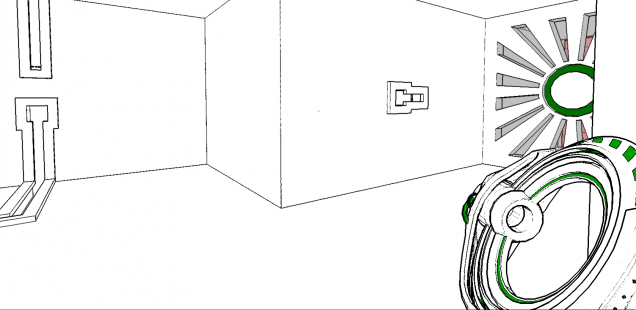
Off The Grid: Dear Escher
Zachary Brictson considers every angle of Antichamber.
Bleak, white corridors sketched with dark lines paint a labyrinth of stairways to nowhere, uncrossable gaps and recursive pathways. A maze not of dead ends, but of mysteries, puzzles, and rooms splashed with technicolor mind trickery. Antichamber is like a first-person expedition through a level designer’s sketchbook, one that arouses incredible curiosity not just for its abstract world, but for how it encourages an abstract approach to that world.
You might pass an empty window frame standing in the center of a blank room, and looking through that purposeless construction, see new paths. Suddenly, you aren’t in the same room anymore. The game’s environment morphs without your acknowledgement, you’ve navigated by complete accident, solutions to similar obstacles calling for the same duplicity. Forget what you know about puzzle games. Try walking through a wall. Try walking on thin air. Consider normal problems an anomaly.
Plastered against the walls are collectible drawings to push you towards this thought process, behind each one a piece of written advice. Finding yourself going in circles, you may just come across one: “The choice doesn’t matter if the outcome is the same.” Such overt messages might come across as superficial, but somehow lend credence to an oddly motivational atmosphere.
Puzzles take the form of lessons instead of challenges, teasing your brain with harrowing problems that come with simple and liberating solutions. Stuck? With a press of a key you’ll fade back to a quick travel map and choose a new chamber. Trial and error becomes seamless, and while white noise and sounds of nature echo through the sterile halls, Antichamber becomes a therapeutic and psychedelic experience, if only for a very short while.
Its reliance on gimmicks – admittedly clever ones – means that it can only remain compelling for as long as it has enough to spare. When it exhausts its creativity, Antichamber decides it should stop with the magic and start abiding more closely to the definition of its genre. Puzzle guns are introduced, and with them some unstated, but rigid rule sets for block manipulation.
Mundane as it sounds, it’s the idea of the game now having a defined structure that betrays the player’s enjoyment. You could explore freely and at your own pace, limited only by your own mind, but now rooms may prove unsolvable if you haven’t acquired a certain colorful tool. Unaware of what rules apply to what chambers and unaware of which gun you lack and where to find it, Antichamber’s recreational tone is quickly lost, the fortune cookie wisdom on the walls ceases to inspire, and suddenly you find yourself in the midst of very malicious design. A torture chamber, if you will.
Zachary Brictson is a Computer Science graduate from Northern Illinois University who chooses to write about games rather than code them, contributing to physical publications like The Printed Blog, sites such as Playstation Universe, and his own blog, Up Magic.